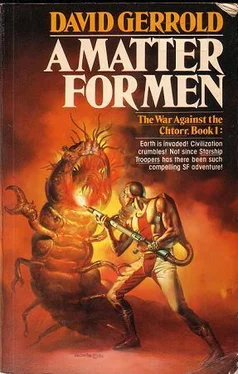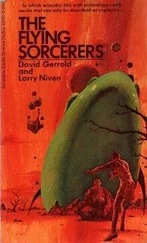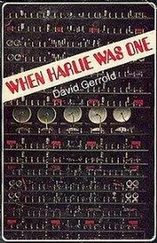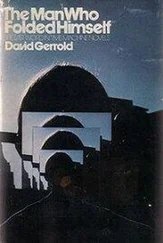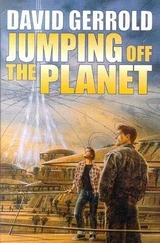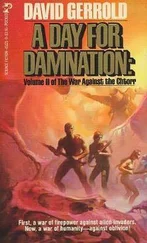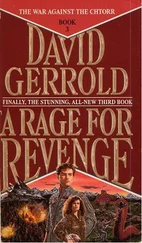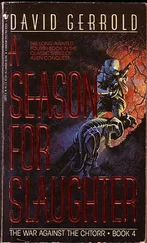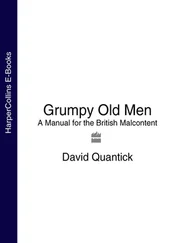David Gerrold - A Matter for Men
Здесь есть возможность читать онлайн «David Gerrold - A Matter for Men» весь текст электронной книги совершенно бесплатно (целиком полную версию без сокращений). В некоторых случаях можно слушать аудио, скачать через торрент в формате fb2 и присутствует краткое содержание. Год выпуска: 1983, Жанр: Боевая фантастика, на английском языке. Описание произведения, (предисловие) а так же отзывы посетителей доступны на портале библиотеки ЛибКат.
- Название:A Matter for Men
- Автор:
- Жанр:
- Год:1983
- ISBN:нет данных
- Рейтинг книги:4 / 5. Голосов: 1
-
Избранное:Добавить в избранное
- Отзывы:
-
Ваша оценка:
- 80
- 1
- 2
- 3
- 4
- 5
A Matter for Men: краткое содержание, описание и аннотация
Предлагаем к чтению аннотацию, описание, краткое содержание или предисловие (зависит от того, что написал сам автор книги «A Matter for Men»). Если вы не нашли необходимую информацию о книге — напишите в комментариях, мы постараемся отыскать её.
A Matter for Men — читать онлайн бесплатно полную книгу (весь текст) целиком
Ниже представлен текст книги, разбитый по страницам. Система сохранения места последней прочитанной страницы, позволяет с удобством читать онлайн бесплатно книгу «A Matter for Men», без необходимости каждый раз заново искать на чём Вы остановились. Поставьте закладку, и сможете в любой момент перейти на страницу, на которой закончили чтение.
Интервал:
Закладка:
"I said, go on."
"Well-um, there was a war. In the Middle East. There are always wars in the Middle East, but this one got out of control. It was between Israel and I forget who, but there were a lot of other countries lined up against Israel. And there were African and Chinese mercenaries involved. And finally it got so bad that Israel had no choice but to threaten to use nuclear weapons. And finally they did."
"And then what happened?"
"The United States withdrew its support for Israel and Israel had to surrender."
"And?"
"Everybody was so scared at what had almost happened that they all went to Russia and signed the Moscow Treaties."
"Yeah." She looked skeptical and turned back to the coffee. "You want milk or sugar?" she asked as she poured. I shook my head. As she handed me the cup, she said, "That version is the one they teach in the schools-but it's so simplified, it's almost a fairy tale. Israel didn't drop those bombs. We did."
"Huh? But that's not-"
"Of course that's not. But the truth is a little less palatable. That was our war and we told Israel to drop those bombs, because we thought it would bring an end to the war. Well, it did-but not the way we thought it would. What they didn't tell you is that the President lost his nerve."
"Huh?"
"What did they teach you in class?"
I shrugged. "The way we heard it, there was a midnight Cabinet session and all of his advisors were arguing loudly back and forth about how many people would die in each exchange and whether or not our third-strike capability would survive, and the President was just sitting quietly at the end through all of this, puffing on his pipe like he always did. And finally, after several long hours, one of the Joint Chiefs of Staff summed it up by saying, `The moral arguments are irrelevant here. The war is inevitable.' And that's when the President said, 'Like hell it is!' "
"Yeah, that's the story. But it's not true. That is, it's only half true. The part you don't hear is about the ultimatum that the Soviet ambassador had handed him just that afternoon. If Israel launched any more nuclear weapons against Soviet allies, the Soviet Union would view those attacks as originating in the United States, and would respond accordingly. It was the same ultimatum that john F. Kennedy handed Nikita Khrushchev in October of 1962, when Russian missiles were discovered in Cuba-and the Russians were aware of the irony of the situation. They used the exact same phrasing in their note."
"I never heard about this," I said.
"You weren't meant to-but that's what was on his mind during that meeting. That the other side had decided that all-out nuclear war was inevitable too."
"But, I always thought he was a hero."
Major Tirelli looked wistful. "So did I-I still do. And maybe he was-maybe it takes more guts to stay out of a war. But either way, we inherited the consequences of that decision."
I sipped at the coffee. It was hot. And bitter. I said, "What we were taught was that he made a speech, an extraordinary speech, in which he said that the responsibility had been handed to him whether or not the world should be plunged into Armageddon. And regardless of the morality of any other issue, this one fact remained uppermost in his mind: if it could be stopped, it had to be stopped, and he would do whatever was required of him to prevent the deaths of millions and millions of human beings. He said that by the act of using nuclear weapons, a nation disqualifies itself from the community of rational thought."
"I heard the speech," she said. "My parents made me stay up to hear it. But I didn't understand what it meant until later. That man went to Moscow, hoping that it would be seen as a gesture of sanity. Instead, they saw it as capitulation and forced him to accept a crippling peace, a debilitating compromise. The tragedy is he knew exactly what they had done to him. Oh, he looked like a hero-he was being hailed as a courageous man all over the world-but he knew what he had given away: America's right to protect her foreign interests. What do you think Pakistan was about? It was an attempt to reestablish the old prerogative. And it failed. This time it was the Chinese who handed us the ultimatum. And this time, the treaties were even more crippling. Do you know what the allies did to Germany after the First World War? They took away that nation's right to an army. That was what was done to us. The United States was told that our existence as a nation would continue only so long as we maintained no direct threat to any other nation on this planet. And the cooperation with that agreement would be monitored by an international committee."
"We never heard this," I said.
"I told you, you weren't meant to. It's a part of our history that we aren't very proud of, so officially, it doesn't exist-like all the other pieces of history we don't acknowledge."
I hid my reaction behind the coffee cup again. When I lowered it, I said, "Is that why the foreign delegates are so paranoid about the way we want to fight the Chtorrans?"
"Right. Very few foreign governments see the Chtorrans as the threat we do. The reasons are varied. Some of them don't see science as anything more than a way to make the crops grow bigger. Others don't think the Chtorrans will be a threat next year because they aren't a threat this year. Most of the people we're dealing with don't even comprehend the scale of death produced by the plagues-so how can they comprehend that the plagues are only a small part of a much larger infestation?"
"Then Dr. Zymph was right?"
"If anything, she was understating the case. You've had enough direct experience with the Chtorr to know what they're like. But try to tell that to someone who's never seen one in action. They won't comprehend it. They don't want to."
"Doesn't that get frustrating?"
Lizard nodded wearily, and grinned. "Incredibly so!" She sipped at her coffee, then said, "Dr. Zymph knew that was how the delegates would react. She was willing to have it. We have to keep putting the facts out, but it happens every time the subject is raised in the international community. The delegates go crazy. They see the Chtorrans only as America's latest rationalization for rearmament. Listen, we're already rearming ourselves. We don't need a rationalization." She shook her head sadly. "But they're frightened; that's what it really is. Just about every nation on this planet is in trouble of one sort or another-there isn't one of them that isn't vulnerable to the first serious military threat that occurs. They're not concerned about the Chtorrans because they've never been bitten by one-but they're sure as hell scared of American military power, because they're still carrying scars. At least we're a threat they can comprehend, so they're displacing their fear and their anger onto us." Lizard looked at me. "Now do you see what kind of cow pasture you stepped into?"
"Ugh," I said.
She glanced at her watch. "I gotta go-but look, you can use the terminal here to tap into the History section of the Library of Congress. You might find it interesting. You probably don't know it, but as a member of the Special Forces, your security clearance is high enough to get you access to most of what you need to know."
"I didn't know that."
"Then you've got an interesting afternoon ahead of you. It'll be a while before anyone can get back to you. Be patient, okay? There are some decisions that have to be made first-"
TWENTY-FIVE
I HADN'T thought about Whitlaw in a while.
I wondered if he was still alive. I'd never given it any thought before; I couldn't imagine him dead. I'd always just assumed he would be one of the survivors.
But then again, I couldn't imagine Shorty being dead either. Or my dad. And they were-so what did it matter whether I could imagine it or not? The universe was going to do what it damn well wanted regardless how I or anyone else felt about it.
Читать дальшеИнтервал:
Закладка:
Похожие книги на «A Matter for Men»
Представляем Вашему вниманию похожие книги на «A Matter for Men» списком для выбора. Мы отобрали схожую по названию и смыслу литературу в надежде предоставить читателям больше вариантов отыскать новые, интересные, ещё непрочитанные произведения.
Обсуждение, отзывы о книге «A Matter for Men» и просто собственные мнения читателей. Оставьте ваши комментарии, напишите, что Вы думаете о произведении, его смысле или главных героях. Укажите что конкретно понравилось, а что нет, и почему Вы так считаете.
